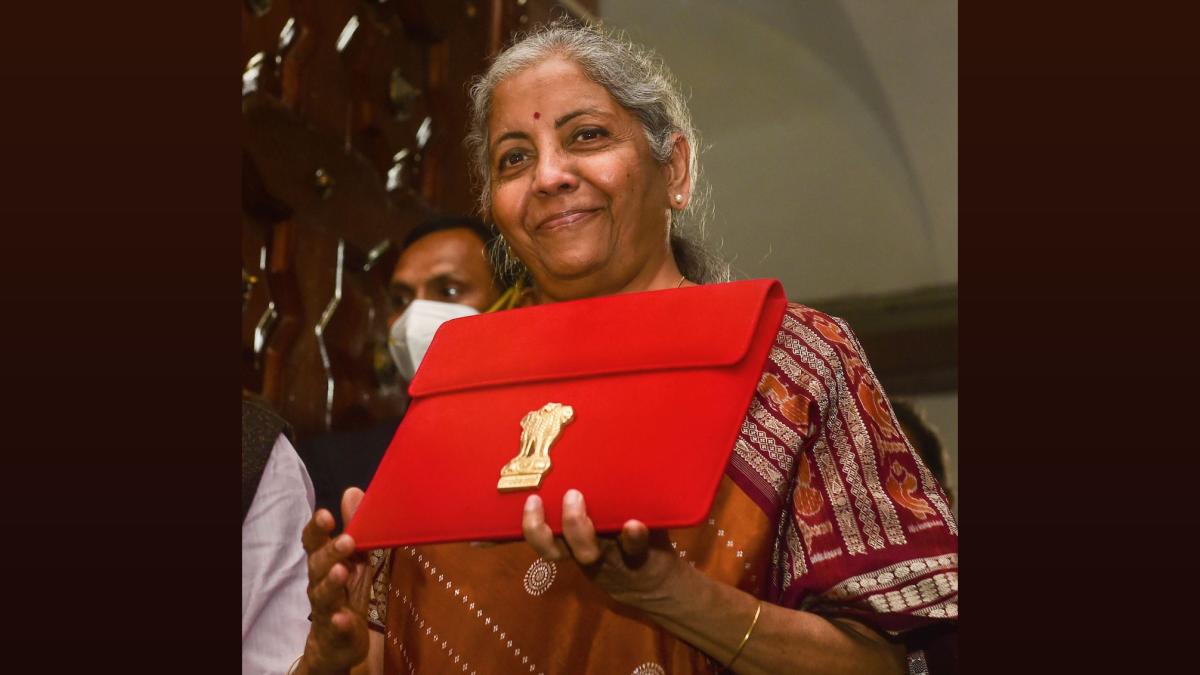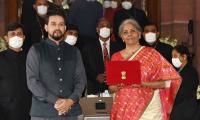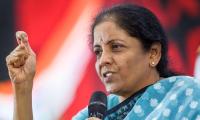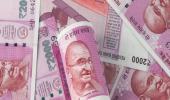Nirmala Sitharaman: Finance Minister for Second Term
Nirmala Sitharaman assumes charge as Finance Minister for a second term, set to present the Budget for FY '25, shaping the Modi government's priorities. Learn about her career and key achievements.

New Delhi, Jun 12 (PTI) Nirmala Sitharaman on Wednesday assumed charge of the Finance Ministry for the second consecutive term and is slated to soon present the final Budget for FY '25, that is going to set the tone for the Modi 3.0 government's priorities and direction for Viksit Bharat.
Upon her reaching the North Block office, Sitharaman was greeted by Finance Secretary T V Somanathan and other top officials.
Minister of State for Finance Pankaj Chaudhary was also present. Chaudhary assumed charge on Tuesday evening.
Sitharaman, who is credited with carrying forward second-generation reforms in her last term, would be creating a record by presenting the seventh Budget in a row and sixth full Budget consecutively.
Full Budget for FY '25 is likely to be presented to the newly formed 18th Lok Sabha next month.
She has many records to her credit in her political career. She created a record when she was appointed as the first female Raksha Mantri, or Defence Minister, in 2017. Prior to that, she was industry and commerce minister.
When her mentor Arun Jaitley (Finance Minister 2014-19) took ill, Sitharaman was given the charge of the finance portfolio in the newly re-elected Modi government after the 2019 general elections.
She became the first full-time woman Finance Minister in Independent India.
Earlier, Indira Gandhi had held finance as an additional portfolio for a short duration when she was the prime minister of India.
Soon after taking over, the first major reform was a cut in base corporate tax to 22 per cent from 30 per cent to prop up the economy hit by demonetisation and GST implementation.
The following year, India weathered the Covid-19 pandemic with an array of policy measures announced for the poor and continued its tag of the fastest growing major economy and a 'bright spot' in the world economy.
To overcome the hardship during the pandemic, the government announced a special economic package worth Rs 20 lakh crore equivalent to roughly 10 per cent of India's GDP.
She steered the economy from nearly 24 per cent contraction in the first quarter of FY21, to the fastest growing world economy.
Despite fiscal expansion, she continued to follow the path of fiscal consolidation and was successful in bringing down the fiscal deficit to 5.6 per cent of GDP, from the earlier estimate of 5.8 per cent in FY24.
She also set a record by presenting the sixth Budget in a row -- five annual Budgets and one interim -- a feat achieved so far only by former Prime Minister Morarji Desai.
After the Modi government came to power in 2014, Arun Jaitley took charge of the Finance Ministry and presented five Budgets in a row from 2014-15 to 2018-19.
In 2017, Jaitley departed from the colonial-era tradition of presenting Budget on the last working day of February to 1st of the month.
Following the footsteps of her mentor, Sitharaman also did away with the traditional Budget briefcase and instead went for a bahi-khata with the National Emblem to carry the speech and other documents.
Born in Madurai on August 18, 1959 to Narayan Sitharaman (who worked in the Railways) and Savitri (a homemaker), Nirmala Sitharaman studied economics at Tiruchirapalli's Seethalakshmi Ramaswami College.
She then moved to the capital to pursue her Master's and M.Phil in the subject from Jawaharlal Nehru University (JNU).
But before Sitharaman forayed into politics, she was part of the corporate world in the UK, where she was living with her husband Parakala Prabhakar.
The two had met while studying at JNU, and tied the knot in 1986. They have a daughter, Parakala Vangmayi.
Sitharaman's political career began in 2008, when she joined the BJP (she returned to India in the early 1990s), and in two years became the party's second woman spokesperson after Sushma Swaraj, fielding questions from journalists at the party headquarters and also becoming a familiar face on television debates.
Prior to taking the political plunge, she served as a deputy director of the Centre for Public Policy Studies in Hyderabad, and also started a school in the city.
From 2003 to 2005, she was also a member of the National Commission for Women.
Upon her reaching the North Block office, Sitharaman was greeted by Finance Secretary T V Somanathan and other top officials.
Minister of State for Finance Pankaj Chaudhary was also present. Chaudhary assumed charge on Tuesday evening.
Sitharaman, who is credited with carrying forward second-generation reforms in her last term, would be creating a record by presenting the seventh Budget in a row and sixth full Budget consecutively.
Full Budget for FY '25 is likely to be presented to the newly formed 18th Lok Sabha next month.
She has many records to her credit in her political career. She created a record when she was appointed as the first female Raksha Mantri, or Defence Minister, in 2017. Prior to that, she was industry and commerce minister.
When her mentor Arun Jaitley (Finance Minister 2014-19) took ill, Sitharaman was given the charge of the finance portfolio in the newly re-elected Modi government after the 2019 general elections.
She became the first full-time woman Finance Minister in Independent India.
Earlier, Indira Gandhi had held finance as an additional portfolio for a short duration when she was the prime minister of India.
Soon after taking over, the first major reform was a cut in base corporate tax to 22 per cent from 30 per cent to prop up the economy hit by demonetisation and GST implementation.
The following year, India weathered the Covid-19 pandemic with an array of policy measures announced for the poor and continued its tag of the fastest growing major economy and a 'bright spot' in the world economy.
To overcome the hardship during the pandemic, the government announced a special economic package worth Rs 20 lakh crore equivalent to roughly 10 per cent of India's GDP.
She steered the economy from nearly 24 per cent contraction in the first quarter of FY21, to the fastest growing world economy.
Despite fiscal expansion, she continued to follow the path of fiscal consolidation and was successful in bringing down the fiscal deficit to 5.6 per cent of GDP, from the earlier estimate of 5.8 per cent in FY24.
She also set a record by presenting the sixth Budget in a row -- five annual Budgets and one interim -- a feat achieved so far only by former Prime Minister Morarji Desai.
After the Modi government came to power in 2014, Arun Jaitley took charge of the Finance Ministry and presented five Budgets in a row from 2014-15 to 2018-19.
In 2017, Jaitley departed from the colonial-era tradition of presenting Budget on the last working day of February to 1st of the month.
Following the footsteps of her mentor, Sitharaman also did away with the traditional Budget briefcase and instead went for a bahi-khata with the National Emblem to carry the speech and other documents.
Born in Madurai on August 18, 1959 to Narayan Sitharaman (who worked in the Railways) and Savitri (a homemaker), Nirmala Sitharaman studied economics at Tiruchirapalli's Seethalakshmi Ramaswami College.
She then moved to the capital to pursue her Master's and M.Phil in the subject from Jawaharlal Nehru University (JNU).
But before Sitharaman forayed into politics, she was part of the corporate world in the UK, where she was living with her husband Parakala Prabhakar.
The two had met while studying at JNU, and tied the knot in 1986. They have a daughter, Parakala Vangmayi.
Sitharaman's political career began in 2008, when she joined the BJP (she returned to India in the early 1990s), and in two years became the party's second woman spokesperson after Sushma Swaraj, fielding questions from journalists at the party headquarters and also becoming a familiar face on television debates.
Prior to taking the political plunge, she served as a deputy director of the Centre for Public Policy Studies in Hyderabad, and also started a school in the city.
From 2003 to 2005, she was also a member of the National Commission for Women.
You May Like To Read
TODAY'S MOST TRADED COMPANIES
- Company Name
- Price
- Volume
- Vodafone-Idea-L
- 11.36 ( -2.49)
- 94664837
- AvanceTechnologies
- 1.16 (+ 4.50)
- 34522155
- Sunshine-Capital
- 0.26 ( -3.70)
- 29015901
- Alstone-Textiles
- 0.27 ( -3.57)
- 28695959
- Mehai-Technology
- 1.65 ( -4.62)
- 28262795






